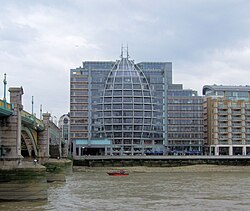
Back أوفكوم Arabic ئۆفکۆم CKB Ofcom Welsh Office of Communications German Ofcom Greek آفکام Persian Office of Communications French רשות התקשורת הבריטית HE Office of Communications Italian Ofcom Japanese
 | |
 Ofcom offices at Riverside House, Bankside, next to Southwark Bridge in London | |
| Abbreviation | Ofcom |
|---|---|
| Formation | 29 December 2003 |
| Type | Statutory corporation |
| Legal status | Created by Office of Communications Act 2002[1] |
| Purpose | Regulator and competition authority for broadcasting, internet, postal services, telecommunications and radiocommunications spectrum |
| Headquarters | London, England |
| Location | |
Region served | United Kingdom |
Official language | English, Welsh |
Chairman | Michael Grade[2] |
Chief Executive | Melanie Dawes |
Main organ | Board of Directors |
| Staff | 902 (full-time equivalents) (2019) |
| Website | www |
The Office of Communications, commonly known as Ofcom, is the government-approved regulatory and competition authority for the broadcasting, internet, telecommunications and postal industries of the United Kingdom.
Ofcom has wide-ranging powers across the television, radio, telecoms, internet and postal sectors. It has a statutory duty to represent the interests of citizens and consumers by promoting competition and protecting the public from harmful or offensive material.[3][4]
Some of the main areas Ofcom regulates are TV and radio standards, broadband and phones, video-sharing platforms online, the wireless spectrum and postal services.
| Office of Communications Act 2002 | |
|---|---|
| Act of Parliament | |
 | |
| Long title | An Act to establish a body corporate to be known as the Office of Communications; and to confer functions in relation to proposals about the regulation of communications on that body, on certain existing regulators and on the Secretary of State. |
| Citation | 2002 c. 11 |
| Dates | |
| Royal assent | 19 March 2002 |
Status: Amended | |
| Text of statute as originally enacted | |
| Text of the Office of Communications Act 2002 as in force today (including any amendments) within the United Kingdom, from legislation.gov.uk. | |
The regulator was initially established by the Office of Communications Act 2002 (c. 11) and received its full authority from the Communications Act 2003 (c. 21).[1]
- ^ a b "Office of Communications Act 2002 – 2002 CHAPTER 11". Office of Public Sector Information. 19 March 2002. Retrieved 23 February 2010.
- ^ "Maggie Carver appointed Ofcom interim Chair from January". Ofcom. 15 December 2020. Retrieved 26 August 2021.
- ^ "Your rights – Ofcom". The Liberty Guide to Human Rights. Liberty. 12 August 2010. Archived from the original on 11 January 2014. Retrieved 11 January 2014.
- ^ Lunt, Peter; Livingstone, Sonia (2007). "Regulating markets in the interest of consumers?: on the changing regime of governance in the financial service and communications sectors.". Governance, consumers and citizens: agency and resistance in contemporary politics (PDF). Basingstoke, UK: Palgrave Macmillan. pp. 139–161. Retrieved 11 January 2014. Footnote 15.
© MMXXIII Rich X Search. We shall prevail. All rights reserved. Rich X Search